★★★½
“You’ve got the balls, you’ve got the skills, and unlike most female boxers, you don’t look like an ugly man-hater.”
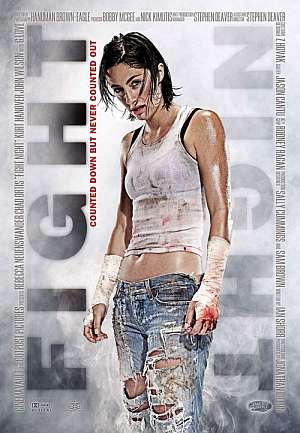 Michael Dublin (Ortis) is a wheeler-dealer, swinging between fixing underground fights and selling dodgy auto parts as need and opportunity arises. When the latter goes wrong, causing the car to explode rather than go faster, he is rescued from a beating by Katherine Parker (Neuenswander), a girl who easily disposes of the attackers, giving Dublin an idea. Instead of rigging the bets by getting good fighters to take a dive, what about winning with someone like Kat, who can win straight-up, but on whom no sane gambler would ever wager? Initially, things go as planned, despite her qualms about being labelled “Kid Vixen”. But Dublin’s reputation precedes him, and he is requested by Richter (Hanover), who runs the underground ring, for his fighter to lose a bout. Ok, “requested” might be the wrong word there. However, Kat is having none of it, leaving her manager with a very difficult choice to make, and choices have consequences.
Michael Dublin (Ortis) is a wheeler-dealer, swinging between fixing underground fights and selling dodgy auto parts as need and opportunity arises. When the latter goes wrong, causing the car to explode rather than go faster, he is rescued from a beating by Katherine Parker (Neuenswander), a girl who easily disposes of the attackers, giving Dublin an idea. Instead of rigging the bets by getting good fighters to take a dive, what about winning with someone like Kat, who can win straight-up, but on whom no sane gambler would ever wager? Initially, things go as planned, despite her qualms about being labelled “Kid Vixen”. But Dublin’s reputation precedes him, and he is requested by Richter (Hanover), who runs the underground ring, for his fighter to lose a bout. Ok, “requested” might be the wrong word there. However, Kat is having none of it, leaving her manager with a very difficult choice to make, and choices have consequences.
The problem is the script, which doesn’t so much avoid the usual boxing cliches as play join-the-dots with them. Both Dublin and Parker have murky pasts and honest ambitions. There’s a steady climb up through opponents until the “boss-level” one against Richter at the end. He beat Kat to a pulp early in her career, yet still resorts to any manner of nefarious schemes to make sure he wins – even threatening Dublin’s life should Kat not go down. And the ending poses a greater danger to the audience’s teeth than anything. That said, I’ve seen worse. Much worse. Here, the other elements of the movie definitely help paper over the cracks in the story, though you need some suspension of disbelief that Parker inevitably KO’s opponents twice her size.
Not beat them, however, since Neuschwander is quick and powerful, her background in taekwondo (where she was a world sparring champion in 2000) clearly apparent, lending the fight scenes a legitimacy perhaps missing from, say, Million Dollar Baby. Acting-wise, she’s surprisingly impressive, given this appears to have been her film debut; she and Ortis have an interestingly-spiky relationship, with their verbal sparring almost as intense as the in-ring bouts. [Credit to the make-up artist, incidentally, for a vivid depiction of the damage Kat takes, which is so nasty as occasionally to be distracting] All told, the strengths outweigh the weaknesses, the performances and direction giving this one a victory on points.
Dir: Jonathan Dillon
Star: Chad Ortis, Rebecca Neuenswander, Kurt Hanover, John Wilson
a.k.a. Rigged





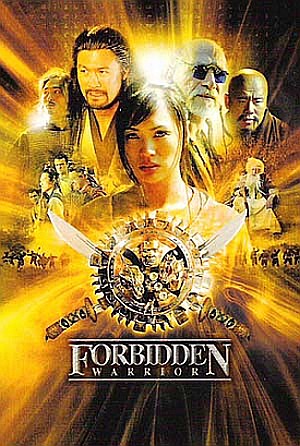 Though I couldn’t put my finger on why, large chunks of this seemed very familiar when I was watching it last night. Maybe it was just the story, cut from a template [mystical book, blah, chosen one, blah-blah, key to all power, etc.] we’ve seen a million times before. But then, when I Googled the film’s title, I realised why: at #6 was
Though I couldn’t put my finger on why, large chunks of this seemed very familiar when I was watching it last night. Maybe it was just the story, cut from a template [mystical book, blah, chosen one, blah-blah, key to all power, etc.] we’ve seen a million times before. But then, when I Googled the film’s title, I realised why: at #6 was 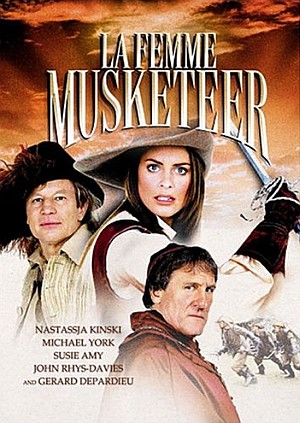 While not the first film to give D’Artagnan a daughter – the fairly self-explanatory D’Artagnan’s Daughter got there a decade before, with Sophie Marceau in the role – this is still entertaining enough, though at 171 minutes, probably too long. Valentine (Amy) heads to Paris to join the King’s guards, only to find herself framed for murder after coming into possession of a letter that could bring down the monarch. Fortunately, the other Musketeers also had children who followed in their father’s footsteps, so she has help as she tries to thwart the evil plans of Cardinal Mazarin (Depardieu) and his henchman Villeroi (Pirae).
While not the first film to give D’Artagnan a daughter – the fairly self-explanatory D’Artagnan’s Daughter got there a decade before, with Sophie Marceau in the role – this is still entertaining enough, though at 171 minutes, probably too long. Valentine (Amy) heads to Paris to join the King’s guards, only to find herself framed for murder after coming into possession of a letter that could bring down the monarch. Fortunately, the other Musketeers also had children who followed in their father’s footsteps, so she has help as she tries to thwart the evil plans of Cardinal Mazarin (Depardieu) and his henchman Villeroi (Pirae). Why let Kei and Yuri blow up one case, when you can save time by giving them two at once? That’s what happens at the start of this, as the WWWA computer assigns them two, apparently unrelated, assignments in the same galactic sector: one is to investigate a spaceship which blew up, and the other involves the disappearance of a scientist and his family. You will not be surprised to hear that these two cases are interconnected, though it does appear to come as a shock to the participants here. Once they reach their destination, it soon becomes clear that someone is out to stop Kei and Yuri – “someone serious,” to steal a line from Leon. Can they uncover the conspiracy before it uncovers them?
Why let Kei and Yuri blow up one case, when you can save time by giving them two at once? That’s what happens at the start of this, as the WWWA computer assigns them two, apparently unrelated, assignments in the same galactic sector: one is to investigate a spaceship which blew up, and the other involves the disappearance of a scientist and his family. You will not be surprised to hear that these two cases are interconnected, though it does appear to come as a shock to the participants here. Once they reach their destination, it soon becomes clear that someone is out to stop Kei and Yuri – “someone serious,” to steal a line from Leon. Can they uncover the conspiracy before it uncovers them?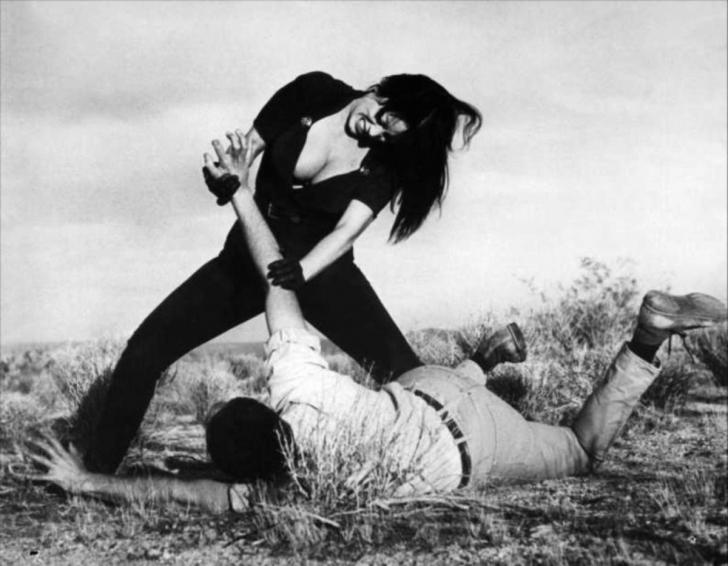
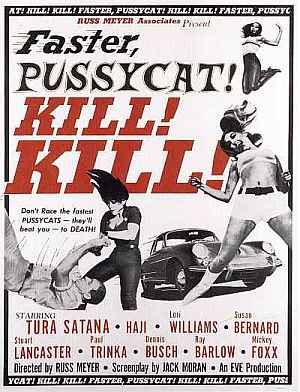
 Made more than forty years ago, Faster was decades ahead of its time – which may explain why it was such a resounding flop on initial release. But in his autobiography, John Waters called it, “The best movie ever made, and possibly better than any movie that will ever be made,” and helped resurrect it: Rob Zombie is another big fan, and introduced its recent screening on – of all places! – Turner Classic Movies. For this is the kind of film, hell, the kind of
Made more than forty years ago, Faster was decades ahead of its time – which may explain why it was such a resounding flop on initial release. But in his autobiography, John Waters called it, “The best movie ever made, and possibly better than any movie that will ever be made,” and helped resurrect it: Rob Zombie is another big fan, and introduced its recent screening on – of all places! – Turner Classic Movies. For this is the kind of film, hell, the kind of  Often neglected are the male contributors, in particular Stuart Lancaster as the target of their scheme. Though confined to a wheelchair, he rules his twisted clan with a rod of iron; in many ways, this is an ancestor of the family from Texas Chainsaw Massacre, with ‘the vegetable’ – as even his own father refers to him – a kinder, gentler version of Leatherface. Seeing the old man slobbering over Linda certainly shifts the audience, and helps to turn the murderous Varla and the other girls from villains into heroines, even as they progress their plan of robbery, because you sense their fate could end up being worse than death.
Often neglected are the male contributors, in particular Stuart Lancaster as the target of their scheme. Though confined to a wheelchair, he rules his twisted clan with a rod of iron; in many ways, this is an ancestor of the family from Texas Chainsaw Massacre, with ‘the vegetable’ – as even his own father refers to him – a kinder, gentler version of Leatherface. Seeing the old man slobbering over Linda certainly shifts the audience, and helps to turn the murderous Varla and the other girls from villains into heroines, even as they progress their plan of robbery, because you sense their fate could end up being worse than death.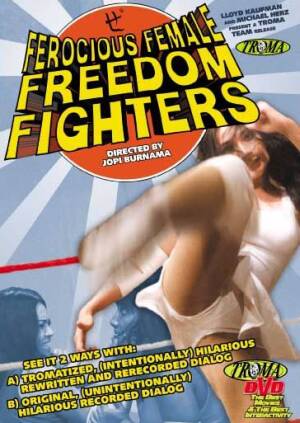 After the excesses of Lady Terminator, I hoped for something equally as berserk here: instead, however, I got a reminder of why I sometimes hate Troma so much. Here, they took a fairly lame Indonesian movie (called, I believe, The Stabilizer) and handed it to the brother of head honcho Lloyd Kaufmann, who wrote a “funny” script and dubbed it: imagine What’s Up Tiger Lily with fart gags replacing all wit and humour. Here’s a sample: they make the hero an Elvis impersonator. Oh, hold my sides, for I fear they may split with laughter…
After the excesses of Lady Terminator, I hoped for something equally as berserk here: instead, however, I got a reminder of why I sometimes hate Troma so much. Here, they took a fairly lame Indonesian movie (called, I believe, The Stabilizer) and handed it to the brother of head honcho Lloyd Kaufmann, who wrote a “funny” script and dubbed it: imagine What’s Up Tiger Lily with fart gags replacing all wit and humour. Here’s a sample: they make the hero an Elvis impersonator. Oh, hold my sides, for I fear they may split with laughter… At first, this isn’t much of anything, least of all an action heroine movie. Cop Simon Yam investigates a customs officer (Shou) who is smuggling guns; it’s pretty ho-hum until an innocent underling is killed after finding evidence of the crimes. When his sister Moon (Lee) and her husband (Lui) get involved, this swiftly leads to the one scene in this film that
At first, this isn’t much of anything, least of all an action heroine movie. Cop Simon Yam investigates a customs officer (Shou) who is smuggling guns; it’s pretty ho-hum until an innocent underling is killed after finding evidence of the crimes. When his sister Moon (Lee) and her husband (Lui) get involved, this swiftly leads to the one scene in this film that 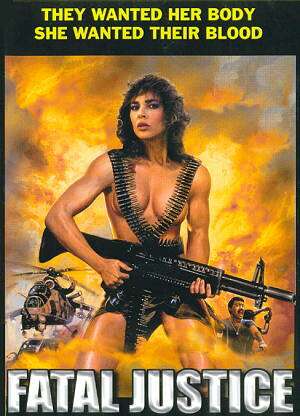 Half a point added for the lurid sleeve, an absolute classic of exploitation, that certainly lurid-ed us (“us?” says Chris – okay, me…) into purchasing, even as I knew it would disappoint. And I was not, er, disappointed in my disappointment. There’s a slight hint of Alias about the plot, in which an agent (Ager) with a penchant for wigs, discovers her father (Estevez) is in the same organization, and that she might not have been working on the side of the angels. It diverges sharply when she is ordered to kill him, along with a training camp for assassins that badly overstays its welcome. [Though it has a decent start, where the would-be hitmen have to cut the patriotic bull and admit they just like killing people.]
Half a point added for the lurid sleeve, an absolute classic of exploitation, that certainly lurid-ed us (“us?” says Chris – okay, me…) into purchasing, even as I knew it would disappoint. And I was not, er, disappointed in my disappointment. There’s a slight hint of Alias about the plot, in which an agent (Ager) with a penchant for wigs, discovers her father (Estevez) is in the same organization, and that she might not have been working on the side of the angels. It diverges sharply when she is ordered to kill him, along with a training camp for assassins that badly overstays its welcome. [Though it has a decent start, where the would-be hitmen have to cut the patriotic bull and admit they just like killing people.]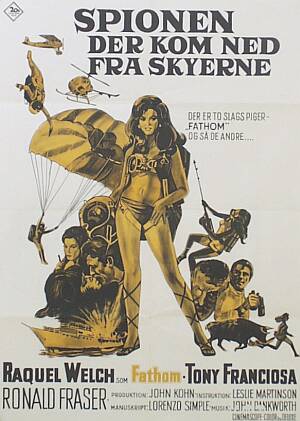 Released five years before Jennifer Garner was even born, there are some odd similarities between this 1960’s time-capsule and Alias:
Released five years before Jennifer Garner was even born, there are some odd similarities between this 1960’s time-capsule and Alias: Odds are you won’t see the key twist here coming, but on the other hand, it renders the preceding hour almost redundant. This sums up the entire film: as an exercise in technical style, few directors are as good at camerawork as De Palma, yet little here withstands scrutiny, despite an abundance of smoke, mirrors and Romijn-Stamos. She plays Laure, a jewel thief who cons her partners out of $10m in diamonds, then is lucky enough to fall into another identity. Seven years later, they get out of jail, still miffed, and she’s now married to the American ambassador. When paparazzi Bardo (Banderas) exposes her identity, she instigates a complex plan to play her various problems off against each other.
Odds are you won’t see the key twist here coming, but on the other hand, it renders the preceding hour almost redundant. This sums up the entire film: as an exercise in technical style, few directors are as good at camerawork as De Palma, yet little here withstands scrutiny, despite an abundance of smoke, mirrors and Romijn-Stamos. She plays Laure, a jewel thief who cons her partners out of $10m in diamonds, then is lucky enough to fall into another identity. Seven years later, they get out of jail, still miffed, and she’s now married to the American ambassador. When paparazzi Bardo (Banderas) exposes her identity, she instigates a complex plan to play her various problems off against each other.